28 Jun 2024
Updated on January 28th, 2025
Transform Your Business With Supply Chain Management (SCM) Software: A Growth Strategy in 2024
Matthew Connor
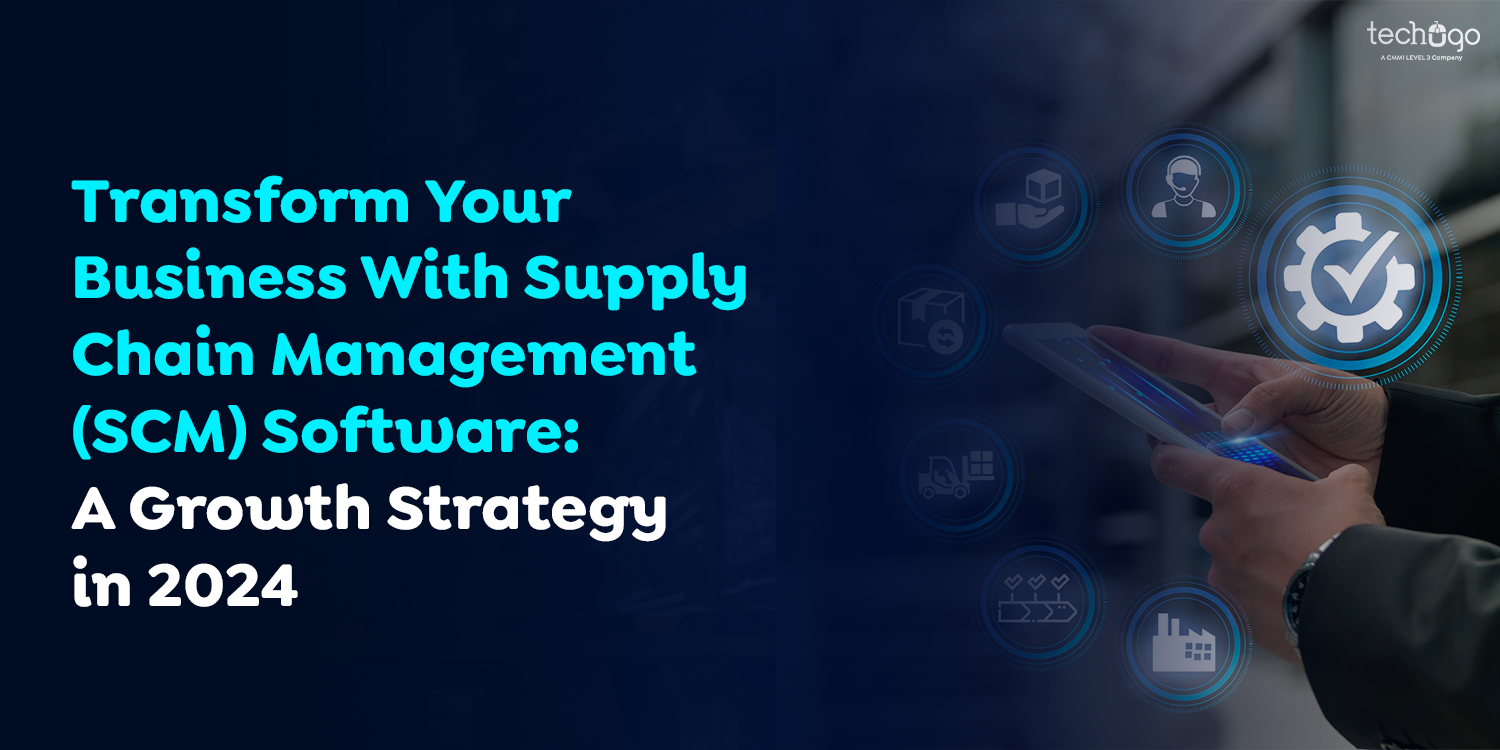
Supply chain management (SCM) software is an essential integrated solution for accurate and efficient coordination that deals with the complex and technical activity of moving goods, sharing information, and transferring funds from one supplier to another and, finally, from the supplier to the customer. Supply chain management software supports optimized performance, cost-cutting and increased customer satisfaction by offering an executive dashboard of supply chains in today’s commercially competitive economy. This technology is a must-have in managing inventory stocks, organizing transports, or ensuring timely deliveries. A food delivery app development company in Canada builds SCM software that can contribute significantly to effectively managing relationships with suppliers and tracking delivery and freshness as a value-added service to their customers.
Are you ready to explore more?
If yes, then let’s first delve into what supply management software (SCM) is.
What is Supply Chain Management (SCM) Software?
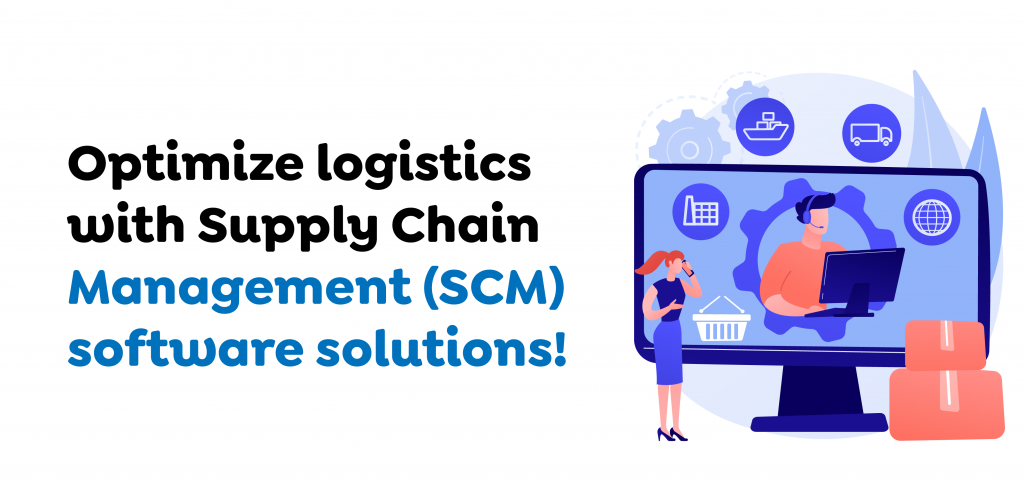
Supply Chain Management (SCM) software is an enhanced application that assists in managing the key logistics tasks in the supply chain, from sourcing material to delivering products to consumers. This software combines functions like purchase, operation and supply chain, order and logistics management, and a supplier relationship management system offering real-time data. The application of SCM software brings benefits in terms of optimization and better control of processes, which could indicate lower costs and faster delivery to the customers’ needs.
Now, let’s delve into the benefits of supply chain management (SCM) software.
Benefits of Supply Chain Management (SCM) Software
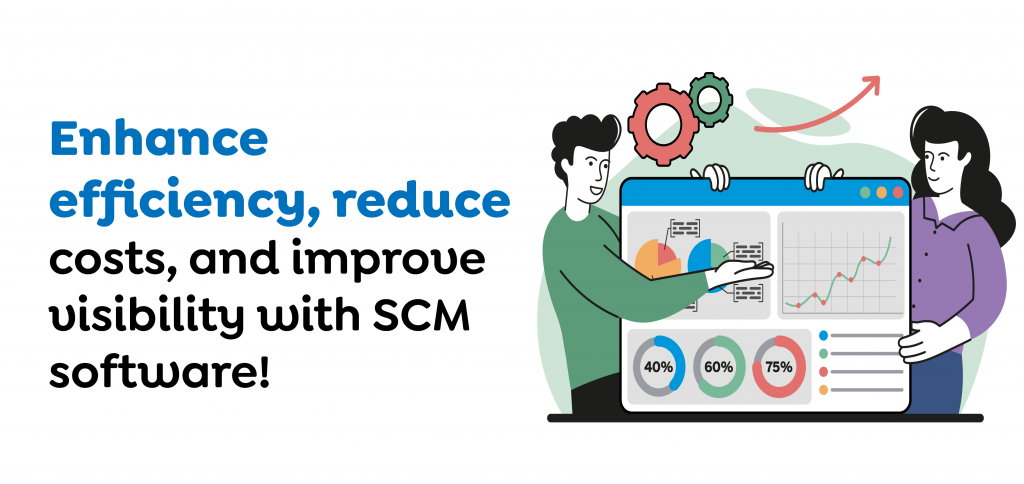
There are many benefits of supply chain management (SCM) software. Let’s explore some of them:
- Reduced Production Cost: It assists in automating SCM strategies and identifying areas for cost reduction through better inventory management and better procurement practices. This leads to substantial fluctuations in production and operating costs.
- Enhanced Customer Satisfaction: Supply chain management (SCM) software enhances customer satisfaction operations as it sends products directly to customers and does not compromise quality. It also provides real-time checking of the accurate demand rate, hence being used by businesses to meet and likely satisfy their customers.
- Improved Operational Efficiency: Deploying integration and automation of several supply chain processes helps in proper coordination, error reduction, and efficiency. Implementation of SCM software can enhance the integration of different departments, lead to appropriate process handling, and eventually accomplish shorter response times.
- Mitigation of Supply Chain Risks: Strategic supply chain management (SCM) software has enhanced analytical and risk management capacities that are beneficial in assessing the probability of disruption. It allows business organizations to effectively monitor events along the supply chain and potentially manage problems, including supply, transport, and other drug-related issues.
After learning the benefits of supply chain management (SCM) software, now let’s discover how it works.
How Does Supply Chain Management (SCM) Software Work?
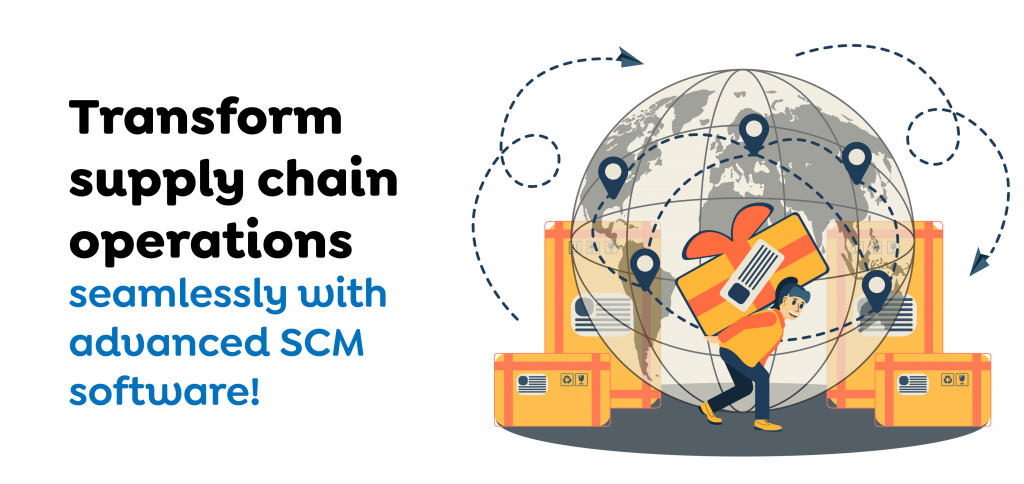
Product Flow: Supply chain management (SCM) software involves transporting the physical assets from the suppliers’ end to customers. Some of the responsibilities include monitoring inventory, supervising the production calendar, arranging transportation, and controlling special and general warehouses. The software assists in the timely delivery of products, thereby avoiding delays that may lead to stockouts or even situations such as overstocking.
Information Flow: It is the system that enables all the members in the supply chain- the supplier, manufacturers, distributors and even the retailers to be in a position to share information. This assists in the tracking of various aspects of production, including the current stock level, the current position of the production process, orders placed, and other aspects related to shipment. Moreover, it also helps to make decisions, minimize the confusion and uncertainty involved, and provide clear signs of how the supply chain is run.
Financial Flow: Supply chain management (SCM) software also performs tasks closely linked to the financial side of supply chain processes, including billing, payment gateways, and financial reporting. It records all expenses at every supply chain stage so that business enterprises can gauge expenses, draft budgets, and improve financial outcomes. The analytical data of financial transactions enhance financial and personal business profitability, lowering software costs.
Moving forward, now let’s explore the phases of supply chain management (SCM) software.
5 Phases of Supply Chain Management (SCM) Software
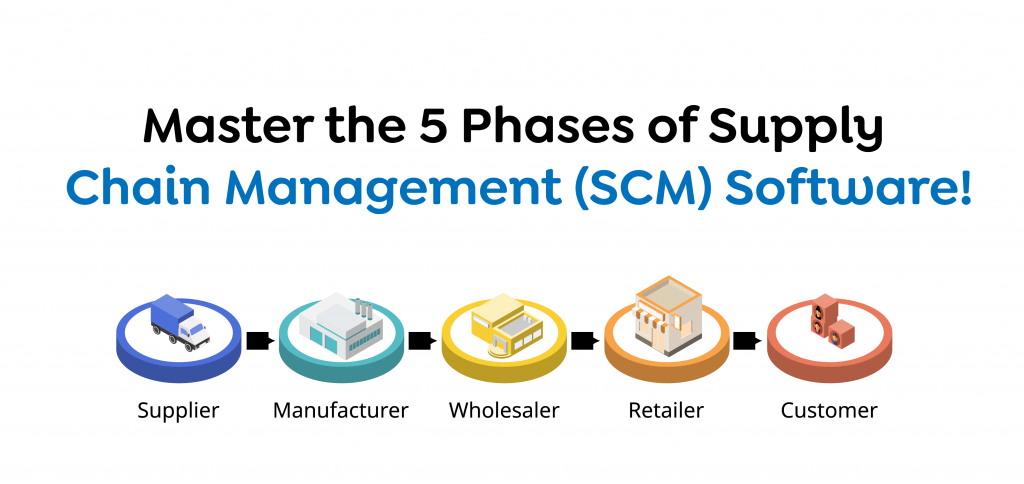
Planning: SCM software provides a more precise forecast of demands that include sales trends, market conditions, and historical data. Enhanced methods reduce inventory costs through lean stock and improve product manufacturing.
Sourcing: It helps select suitable suppliers for the organization using SCM software powered by artificial intelligence. It could result in the analysis of large datasets of supplier performance, reliability, and risk in our sourcing relationship with them. The innovative development of the procurement processes includes using blockchain technology to track and secure transactions and compliance.
Manufacturing: Connected supply chain software and IoT (Internet of Things) devices fit into the manufacturing production line to constantly assess equipment health and determine when it will require maintenance, preventing breakdowns. Other information about an entity includes automated production schedule planning that affects operations, machine availability, and labour force. Using robotics and automation on the production floor increases production speed, precision, and economic value.
Delivery: SCM software also uses GPS solutions while applying route optimization AI to maximize effectiveness. Through predictive interventions, the analytics assess the likelihood of late deliveries and successfully reroute the cargo on time. Cloud-based platforms help enable effective interactions and weekly communications between logistics partners and the supply chain.
Returns: Promotional AI techniques help to decipher returning patterns and returns-related customer reviews to easily determine the source of returns and recommend prevention means. Implementing ML models can help folks know the potential of a product return from historical data and customer behaviour to minimize the possibility of the return. Through blockchain, there is increased transparency and credibility in the returns process, providing names for returned products and being held accountable for such actions.
Now, let’s explore the various types of supply chain models.
Types of Supply Chain Models

There are many types of supply chain models. Here are some of them:
- Continuous Flow Model: This best supply chain flow is also known as a closed loop where products flow through the various stages of the supply chain continuously. It is most suitable for organizations that deal with huge quantities of standard products whose demand is relatively stable. It focuses on reducing operations costs while ensuring that he or she maintains efficiency, which will reduce wastage.
- Agile Model: The kind of supply chain proposed here is the agile supply chain model, which concentrates more on sensitivity to changes in the environment, or in this case, market conditions and consumers. It stresses issues related to adaptability and decision-making processes, making it possible to react effectively to current market requirements by adjusting production plans, stocks, and supply chains.
- Fast Model: The fast supply chain model is also referred to as the responsive supply chain model, as it aims to provide speed and quick responsiveness when meeting customers’ orders. It entails keeping inventory stocks as low as possible and using techniques such as tracking, timely shipping, and the like to meet or beat the stipulated order processing and shipping time.
- Flexible Model: The flexibility of a supply chain is attributed to reference model choice and its capability to adopt different variations and customer circumstances. It involves structure and the structure components, and it is based on the idea that processes and resources can be rapidly reconfigured to adapt to shifts in demand, supply or market conditions.
- Efficient Model: The efficient supply chain concept is an integrated approach that focuses on cost and resource use efficiency by achieving acceptable service standards. It is centred on increasing efficiency, cutting costs, and attaining scale without expense gains via exercises like eliminating nonessential activities, using only the necessary supplies and services at the required time, and delegating nonessential tasks to other parties.
- Custom Model: The custom supply chain model allows for the focused satisfaction of particular industries, products, or customers’ needs and demands. It encompasses conceptualizing and creating supply chain solutions and operations tactics that would fundamentally support organizational targets and strengths while delivering customer solutions and concepts.
If you are wondering which key technologies are used in supply chain management (SCM) software, then let’s discover them.
Key Technologies Used in SCM Software
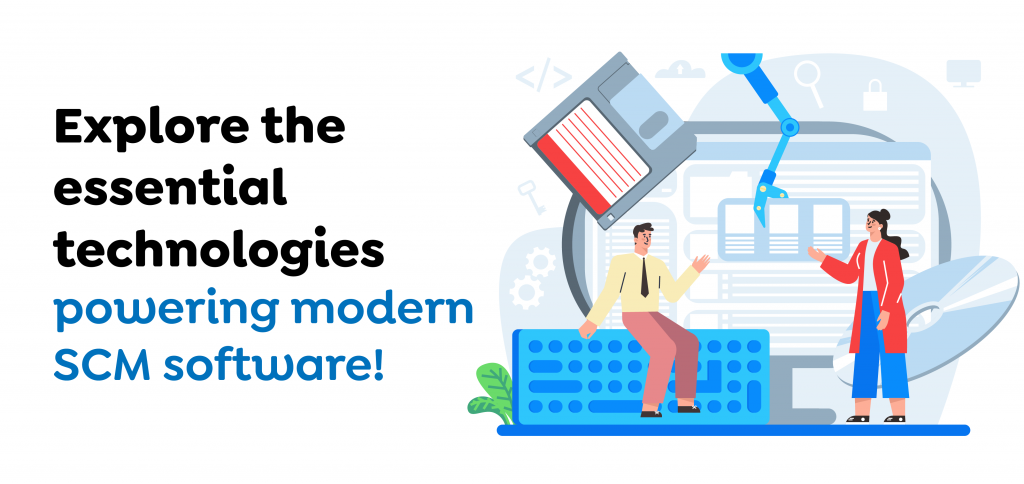
SCM software employs various technologies to drive business activities, increase transparency, and improve control of the supply chain procedures. Some key technologies used in SCM software include:
- Artificial Intelligence (AI): AI in demand, forecasting, analytics and optimization of the various chain-related activities. AI enhances decision-making capabilities by processing vast amounts of data and creating a regression that will make systems more effective and timely in their response.
- Machine Learning (ML): In SCM software, ML algorithms are used to recommend the time for maintenance, proper stock levels, and supplier performance evaluations. Since ML algorithms apply analytic approaches and draw upon past information to generate accurate predictions and guided directions, organizations can use them to predict demands and risks and allocate resources efficiently and effectively.
- Blockchain: Other aspects implemented in supply chain management (SCM) software include an application of blockchain technology to drive SCM’s efficiency by making supply chain transactions clear, traceable, and secure. Using blockchain makes it easy to keep secure records of products to ensure they are tracked from their source to the destination and that the records kept are accurate and original, thereby avoiding counterfeits.
- Cloud Computing: Some SCM solutions are implemented to provide scale and flexibility and to be accessible when needed. They are hosted on the cloud, meaning that businesses can access the data and/or applications remotely. The implementation of cloud computing in SCM provides real-time collaborative tools, integration data streams, and analytical models in decentralized supply chain entities.
- Big Data Analytics: Big data analytics tools are incorporated in supply chain management (SCM) software, where data from various business activities like unit sales, production line, and logistics, amongst other records of customer satisfaction, are processed and analyzed. Big data analytics is also an advantage to the supply chain because it increases understanding of supply chain key performance indicators, customer buying habits, and the market, which is used as a framework for making strategic business decisions that promote successful supply chain business.
Why Opt for Techugo for SCM Software Development?
Techugo remains the ideal choice as the prime developer of supply chain management (SCM) software, and this is based on unique strengths such as expertise, innovative mindset, and tested success in delivering the best results. Techugo has been a leading developer of SCM software solutions in Canada for many years, with experienced programmers, designers, and consultants capable of designing and implementing innovative, customized solutions supporting modern technologies which meet current requirements and industry trends. A grocery delivery app development company in Canada builds and maintains SCM software on the backbone of strict commitment and the accurate selection of the key values and principles of working with clients.
Conclusion
Lastly, the implementation of supply chain management (SCM) software highlights the tool as a valuable and essential presupposition in today’s complex business environment. SCM software enables organizations to consolidate and improve their supply chain function, increase transparency or address certain issues using supportive technologies such as AI, IoT or blockchain. Supply chain management (SCM) software is the answer to techniques required to forecast demand and manage inventory, organize the logistics and delivery of materials, and ensure timely deliveries. SCM is how companies can maintain and improve their flexibility, efficiency and competitiveness on the global stage.
In addition, building SCM software with the help of Techugo, a mobile app development company in Canada, is the best move for individuals and businesses alike, as it provides premier competence and creativity in the said field.
Get in touch with us today to begin a journey towards digital transformation and excellence together.
Get In touch
We are excited to here from you and let’s start something special Together. Call Us for any inquiry.
Write us
sales@techugo.caJust a call away
About you




